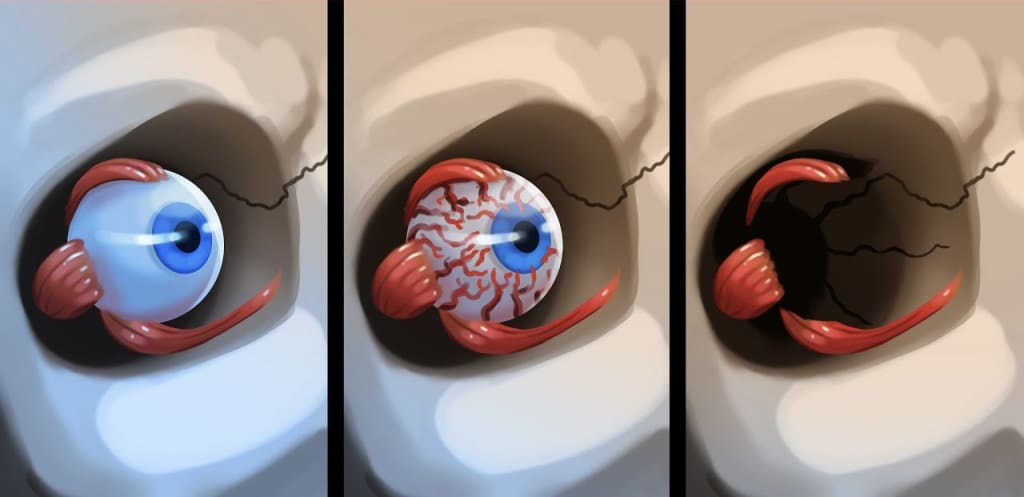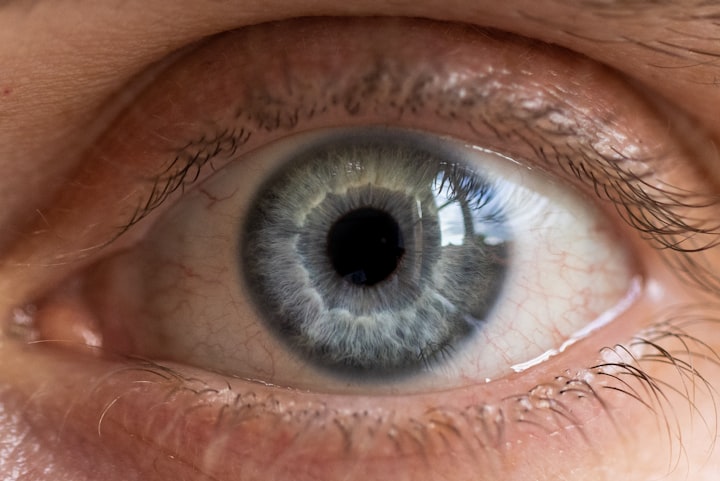What IF You Stopped Blinking (Minute by Minute)
You do it hundreds of thousands of times a day without even noticing, but if you stopped you could be blind in hours. Check out what happens to your eyes if you stopped blinking in today's insane new blog!

Blinking- by the time I finish this sentence, you'll have blinked at least once. It's something we do without thinking, and good thing too because we do it so often. But what if you stopped blinking forever? The consequences can be shocking. In one hour you're going to blink between 900 and 1200 times. In a single day, you'll blink between 14,400 and 19,200 times. In a week that's 100,800 to 134,400 times. And in a year it's a whopping 5.2 million and 7.1 million blinks, giving your eyelids a real workout. Every time you blink your brain is taking a micro rest to process information.
Blinking is super important, which is why when you stop things go bad real quick. 1 Minute At first you feel fine, and most of you have had a good old-fashioned staring contest at least once in your life so you're pretty familiar with what it feels like to go a minute without blinking. What's going on in your eyeball might surprise you though. Within thirty seconds the thin layer of moisture in your eye has begun to evaporate. This is a layer of water moisture that is delivered straight to your cornea through the process of blinking. You might have noticed, but your cornea doesn't have any blood vessels, so the only way that it can receive water to keep it hydrated is through blinking. That's why after thirty seconds your eyes begin to feel dry, and you'll begin to feel some slight pain or discomfort. This is your cornea starting the process of dehydration, and if you thought dehydration of your general body was bad, it's even worse with your eyes.
Generally, when you're suffering from actual dehydration you don't notice it much in your eyes until the symptoms become extreme, at which point you'll feel like your eyes are slightly bugging out more on this later- making your eyes mildly uncomfortable. This is because like your brain, your body considers the eyes to be of vital importance to your survival and prioritizes delivering what little water is available in your body to them. After all, if you can't see your odds of survival have just plummeted dramatically. Remember how we told you the cornea has no blood vessels? Well, blinking does more than just deliver water and by the end of your first minute without blinking you've already interrupted the vital process of delivering much-needed nutrients to the cornea tissue. You've started starving your eyeballs. 2 Minutes When you enter your second minute you'll start to notice your eyes getting bloodshot. That's a direct effect of your corneas drying out as your body tries to pump more moisture to the eyes in anyway it can.
The lack of moisture by now will have dried out the corneas so much that you'll notice greatly increased pain and discomfort. After two minutes of not blinking, you've now created a dangerous bacterial condition in your eye. Each blink helps not just moisturize the surface of the eye, but sweep away debris and cover the eyeball in mucous secretions that help fight and prevent infection. Now, any debris that lands on your eye- including airborne germs, moulds, and other nasty things- is going to stay there. In the case of numerous types of bacteria, they'll soon start reproducing out of control, making your no-blinking situation even worse over time. 3 Minutes After three minutes of no blinking the average person will be unable to resist the eye's natural response to flooding the eye with tears. At this point, your brain is mutinying against you, and since you're not going to bother to lubricate your eyes it's going to instruct the tear ducts in your eyes to do it for you.
Your eyes will grow increasingly watery as the tear ducts dump out all available moisture to try to save your eyes. This might help, but only temporarily. 5 minutes After crying your eyes are all out of tears and are going to need time to restock. This means that the tears that flooded your eyes are going to be evaporated by now. Your eyes are once more unprotected and unmoisturized and will be extremely bloodshot at this point. The pain is increasing in intensity but is still likely quite tolerable. You'll notice that your vision is starting to become blurry. Your tears are vitally important to the health of your eye, and your refusal or inability to blink has now cut the cornea off from a vital source of oxygen. Your blurry vision is only temporary at this point, but if you continue not blinking it could turn permanent. Even if you just experience regular dry eyes in your life, the possibility of permanent vision loss is very real if you don't seek treatment.
15 minutes Your eyes are nearly completely dry at this point, causing them to start to swell up in your eye socket. This will lead to an increase in pain, which can be quite intolerable at this point. This pain is not just a symptom of your eyes dehydrating and dying in your skull but is also meant to get your attention. Your brain is trying to tell you that not blinking is a really bad idea and you really should get some moisture into your eyeballs as soon as humanly possible. 20 minutes By now the dryness has begun to affect the protective tissues of the eye. The corneal epithelium is a layer of tissue that covers the front of the cornea- if you've had Lasik surgery then this is part of the protective tissue that is neatly sliced away to give the laser direct access to the cornea itself. Normally, the corneal epithelium helps prevent your tears from getting into the cornea and bringing along with them all sorts of nasty stuff that's on the surface of your eyeballs like dust, insects, and other debris. But it also helps protect the cornea from bacterial infection by acting as a physical barrier. Without being regularly hydrated though, this layer of tissue is going to become tougher and get increasingly cloudier.
For now, the damage is only temporary, but its effects could be permanent if you continue being unable to blink. The cloudy tissue is going to make your blurry vision even worse. At this point you're also noticing that your eye is starting to swell, adding a feeling of pressure along with the pain. 90 Minutes The Guinness Book of World Records does not keep any records that could be potentially dangerous or fatal, so, therefore, it refuses to authenticate any records of the longest time without blinking. However, if you've reached ninety minutes without blinking you've officially tied the man who is believed to hold the current world record for not blinking. Anand Haridas, a teacher from Kannur in India, used his skills in Trataka, a type of yogic meditation technique, to stare at a fixed point for a whopping 1 hour and 31 minutes. Haridas claims that he began practising by staring at a black dot on a wall, and initially couldn't get past the five-minute mark due to the pain and heavy tearing up.
Eventually, he got up to twenty minutes and then after three years of training broke the one-hour mark. Setting a world record is great, but if you can get this far you probably need some yoga meditation techniques of your own because the pain from your dried-out eyes is going to be intense. 2 Hours At this point dehydration has begun to damage the thin tissues of the surface of the eye and the inner eyelids. Known as conjunctiva, this tissue helps protect the eye during normal operation, but by denying it the much-needed hydration it requires you've started the process of dehydrating some of the most delicate tissues in your body. The damage is still not permanent, but soon it will be and will lead to serious vision loss. 4 Hours Your cornea has been starved of water for so long that the damage has begun to spread into the deeper tissues. Dehydration has compromised the function of the cornea, and as the tissues shrink from dehydration, your vision becomes even worse. Despite this shrinkage though your eyes are swelling as the body tries to pump more blood into them, causing extreme discomfort and growing pain as your eyes begin to feel like they're going to pop out of your head. 8 Hours You haven't blinked in eight hours, and your eye hasn't been able to remove all the random bits of debris that floats around in the environment around you.
With nowhere to go, all that dust and debris stick to the outer layer of your eye and accumulates, leading to the growth of black dots in your vision. The longer you go without blinking, the bigger these dark spots will get as more and more junk builds up on the surface of the eye. 12 Hours Your eyes are being dehydrated from the outside in, but your pupils still have a job to do. To compensate for your increasingly worsening vision, they grow large as they try to gather more light through the increasingly filthy and cloudy surface of the eyes. You might gain a temporary increase in vision, but it will be short-lived. At this point, you're causing permanent damage to your eyes as they are dying of thirst. 24 Hours The extreme pain and discomfort will make it impossible to sleep, no matter how hard your brain wants to take a break and shut things down. Eventually, you might get used to having your eyes open and sleep much in the same way that some people do with their own eyes open, but those people still blink from time to time. Because you're not blinking, not only do your eyes become even more swollen, but the infection will have set in as bacteria replicate out of control on the surface of your eyes.
2 Days Your vision has deteriorated so badly at this point that you're suffering from double vision, unfortunately, all that means is that you're seeing two equally bad pictures because your vision is still extremely blurry and clouded by black clouds of debris. You could experience as much as 30% vision loss at this point simply from the amount of debris and bacteria replicating out of control on the surface of your eyeball. 3 Days By the third day we have some good news- you no longer feel the horrible pain in your eyes. The bad news is that the reason you're not feeling pain is that your eyes are dying. Vision loss at this point is permanent, even if you begin blinking and washing the debris out of your eyeballs. Dehydrated tissues have been starved of water for so long that they have died, severely impacting the function of the eye. Bacteria, which have been running amok, have also now begun to eat the dying tissues of the eye. If you see anything at all, it's a dark, cloudy milky-white mess as your dehydrated eyes struggle to continue to function.
6 Days Your vision loss is now permanent and probably total. Bacterial infections have rampaged out of control and even penetrated the deeper layers of the eye, which are supplied with water through blood vessels. The structural damage to the outer layers is now complete, with the tissues having been completely desiccated. Not only are you permanently blind at this point, but you have also thrown the door open for bacteria to infect the rest of your body.
Given the proximity to your brain, the only way to survive the infection at this point is to completely remove the eyes, stopping the infection from getting deeper into your skull. With no eyes though you at least finally have a reason to not blink anymore.
About the Creator
Jayveer Vala
I write.






Comments
There are no comments for this story
Be the first to respond and start the conversation.